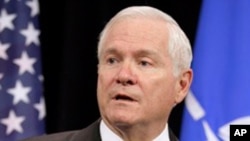U.S. Defense Secretary Robert Gates says international sanctions against Iran because of its nuclear program are causing division among the country's leaders, and are the best way to convince them to abandon the program.
Secretary Gates says Iranian leaders have been surprised by the extent and impact of international sanctions that have been imposed based on the U.N. Security Council resolution passed in June. Gates told a gathering of executives sponsored by the Wall Street Journal newspaper the sanctions are causing problems between Iranian President Mahmoud Ahmedinejad and the country's supreme leader Ayatollah Ali Khamenei.
"Those measures have really bitten much harder than they anticipated," he said. "And we even have some evidence that Khamenei is beginning to wonder if Ahmedinejad is lying to him about the impact of the sanctions on the economy, and whether he's getting the straight scoop [information] in terms of how much trouble the economy really is in."
Secretary Gates said he believes the Iranian leaders are intent on developing nuclear weapons, a charge they have denied. Gates said the only long term solution to the problem is to use sanctions and diplomacy to convince the Iranians that developing the weapons is not in their interest.
"Everything else is a short-term solution, is a two-to-three-year solution," said the defense secretary. "And if it's a military solution, as far as I'm concerned, it will bring together a divided nation, it will make them absolutely committed to attaining nuclear weapons and they will just go deeper and more covert."
Still, Gates and other senior U.S. officials have not ruled out military action, and last week Israeli Prime Minister Benjamin Netanyahu said western nations must convince Iranian leaders they are willing to strike if they do not agree to abandon their nuclear program.
That program will likely be a topic at this week's NATO summit, including efforts to deploy a missile defense system designed to protect European countries from a potential Iranian attack.
Gates Says Sanctions Cause Iranian Rift, Opposes Military Strike




